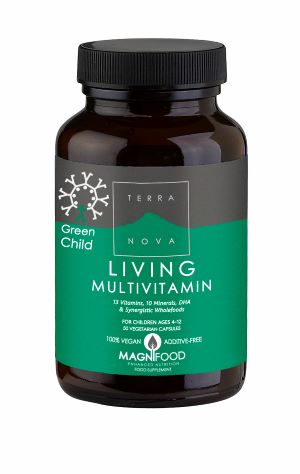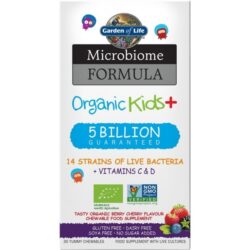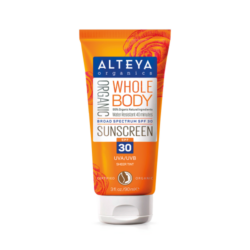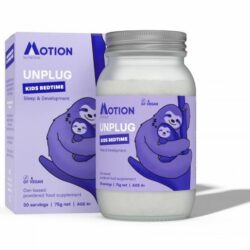This Children Multivitamin contains: MAGNIFOOD COMPLEX 330mg, which provides: Spirulina (Spirulina platensis) – organic 100mg, Stabilised Rice Bran Solubles 50mg. Organic beetroot Juice/greens (Beta vulgaris) 50mg, Blackberry (Rubus fruticosus) 50mg, Organic spinach (Spinacia oleracea) 20mg. Broccoli Sprouts (Brassica oleracea) organic 20mg, Watercress (Nasturtium officinale) 20mg, Dandelion Leaf (Taraxacum officinalis) organic 20mg.
Vitamin C (as Ca, Mg, Zn ascorbate) 50mg, Calcium (as carbonate, citrate, ascorbate) 50mg, Magnesium (as oxide, citrate, ascorbate) 25mg. DHA (from algal oil) 25mg, Niacinamide 8mg, Vitamin E (d-alpha tocopheryl succinate 7.5iu) 5mg, Pantothenic Acid (as calcium pantothenate) 5mg. Iron (as bisglycinate) 5mg, Zinc (as ascorbate) 3mg, Vitamin B2 (riboflavin) 1mg, Vitamin B6 (as pyridoxine hydrochloride) 1mg. Vitamin B1 (as thiamine mononitrate) 0.8mg, Manganese (as bisglycinate) 0.5mg, Vitamin A (as palmitate prep) 400ug, Copper (as gluconate) 300ug. Folate (as calcium l-methylfolate) 200ug, Iodine (as potassium iodide) 75ug, Biotin (as prep.) 50ug, Selenium (as selenomethionine) 20ug. Chromium (as picolinate) 10ug, Vitamin K1 (as phytonadione prep.) 10ug, Vitamin D3 (vegan cholecalciferol from lichen 200iu) 5ug, Molybdenum (as sodium molybdate) 2.5ug, Vitamin B12 (as methylcobalamin) 2ug.
I am very confident recommending this This Complete Children Multivitamin because of the superior and much more bioavailable chemical structure of nutrients, because of the MagniFood, which increases bioactive nutrients function. It doesn’t contain filler or binders. It uses mostly organic ingredients.
Alongside a multivitamin, a probiotic and a complete omega, also including EPA, could also be indicated.
Study:
Your gut health, to include its resident beneficial bacteria hold the key for optimal health. This study looked at how gut microflora in children may modulate atopic dermatitis in children. From that study: “Atopic dermatitis (AD) is a chronic inflammatory skin disorder characterized by relapsing eczematous injuries and severe pruritus. In the last few years, the AD prevalence has been increasing, reaching 20% in children and 10% in adults in high-income countries. Recently, the potential role of probiotics in AD prevention has generated considerable interest. As many clinical studies show, the gut microbiota is able to modulate systemic inflammatory and immune responses influencing the development of sensitization and allergy.
You can use probiotics increasingly against AD. However, the molecular mechanisms underlying the probiotics mediated anti-allergic effect remain unclear and there is controversy about their efficacy. In this narrative review, we examine the actual evidence on the effect of probiotic supplementation for AD prevention in the pediatric population, discussing also the potential biological mechanisms of action in this regard.”






Reviews
There are no reviews yet.